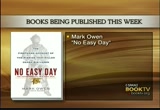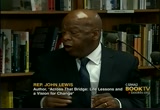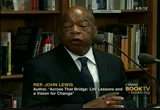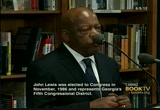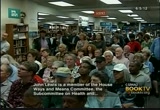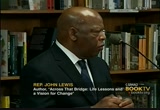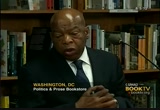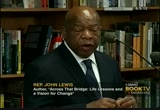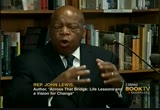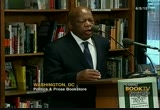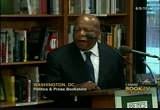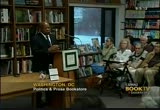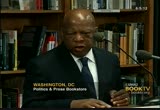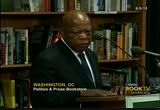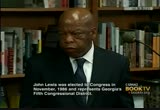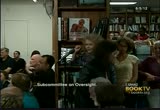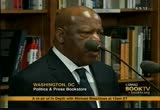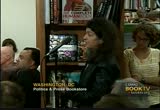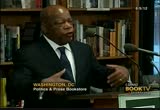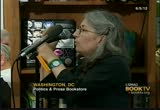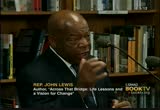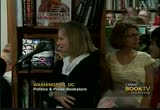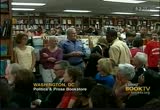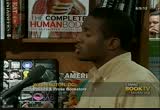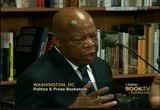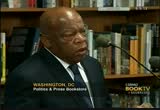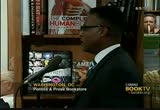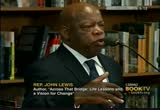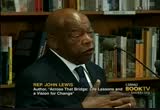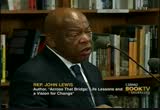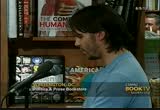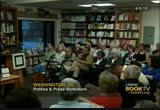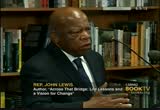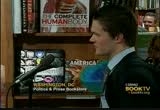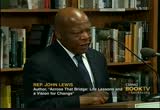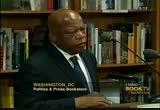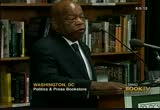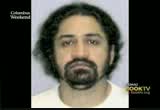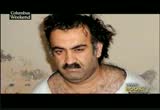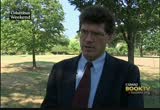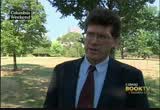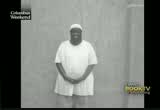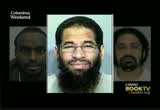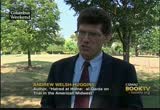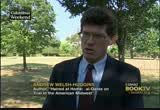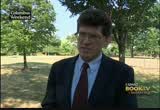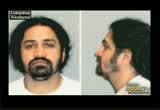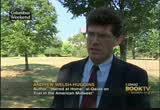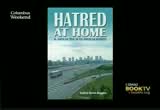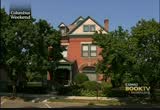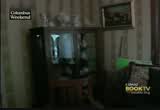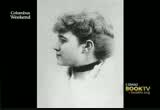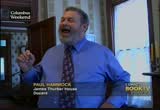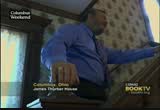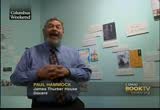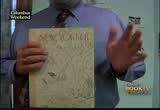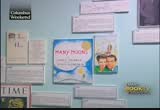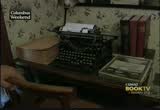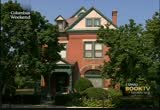tv Book TV CSPAN September 2, 2012 11:00pm-12:00am EDT
11:00 pm
11:02 pm
if a little place called troy. my father was a sharecropper. back back in 1944 when i was 4-years-old, and i do remember when i was four. how many of you remember when you were four? [laughter] what happened to the rest of us? for $300 you put 1800 acres of land and all of this land there were cottons growing and chickens and was my responsibility to care for the chickens, and i fell in love raising chickens. i became very good at raising chickens. those chickens taught me something long before i got involved in the civil rights movement. it taught me patients. they taught me to wait. they taught me to never give up and never give in. if i set those with fresh eggs in three weeks i would have
11:03 pm
little chicks. but the philosophy and the discipline that i came to embrace when i was only about 18-years-old like a 1955 trip the age of 59 per of rosa parks and martin luther king jr.. i heard him speaking on the radio talking about non-violence and the resistance. as a young person to start studying the way of peace, the way of love, the way of nonviolence to lead down the burden of bitterness, the burden of heat trying to move towards a sense of community, the sense of one family, one people, one house. in this little book across that
11:04 pm
bridge, i tried to suggest that there is a better way, there's a better example of moving towards a sense of community, not just american cony in may but the world community. what is faith all about? it's keeping the philosophy and discipline of nonviolence to believe somehow in some way that you are going to succeed and you are going to overcome you have to be persistent, and you have to insist. you have to be like a tree planted by the rivers of water. that you are anchored and you may be beaten and get arrested and go to jail over and over again that you have to keep your
11:05 pm
faith. keep your eyes on the prize and never ever give up. never give in. before we went on any city, any march, before we went on the freedom rides in 1961 with the same year that president barack obama was born, we studied. we prepared ourselves. i came to washington, d.c. if the first time in 1961. first of us, black-and-white preparing to go on the freedom ride. we met right here in washington, d.c.. 21-years-old i had all of my hair and was a few pounds lighter. [laughter] we studied and prepare ourselves. the night of may 3rd, 1961, we
11:06 pm
went down to the chinese restaurant right here in washington, d.c. for a meal. growing up in rural alabama and attending school in man's real i'd never been to the restaurant, never had the food but that that night someone said you should eat well because this may be like last supper. may 4th, 1961 we boarded a screen helm the bus, some boarded the trade training and travel from washington through virginia, the liner, we arrived in a little town and we were tight and beaten and left bloody but one of the same young men that attacked and beat me and my
11:07 pm
seatmate came to my office and should be wary of 09 and said mr. lewis, i'm one of the people that attacked. i want to apologize. please forgive me? his son was with him and he'd been encouraging his father to seek out the people that he attacked, start crying, the father started crying, they both gave me a hug and i started crying. this book speaks of reconciliation. the bill become the capacity to be reconciled to move towards the community and if you believe in something you should speak up and speak out and stand up and fight for a.
11:08 pm
you have to be consistent. you have to insist on the truth. not one thing is stronger than the truth. there may be setbacks and disappointment, but in the long scheme of things, you are going to win and succeed. the way of peace, the way of love, the way of nonviolence, the way of truth will win. this book has suggested whether it is in the middle east, and africa coming in america or a planet this little piece of real
11:09 pm
estate that we call earth, that we can as dr. king suggested learn to live together, brothers and sisters. gondhi put it another way. it is nonviolence or nonexistence. it is my hope that young people and people not so young will use of cross that bridge to find a way to get away. to find a way to get in trouble, unnecessary trouble and disturb the order of things. when i was growing up, my mother and father and grandparents and great grandparents would say don't get in trouble, don't get in the way. in the through study and
11:10 pm
listening, through being patient i got in trouble, good trouble and necessary trouble, and i feel it's time for the american people to get in trouble again. good trouble. [applause] as a people and a nation we are to quiet. we need to make some plays. we need to push and pull and do what we can to redeem the soul of america and save this little planet not just american community but save this plan at regeneration as yet unborn. i happen to believe for years of work and service the vote is the most powerful nonviolent tool we
11:11 pm
have in a space society and we have to use it. we have to use it. there's an attempt today a direct systematic attempt to make it impossible for people to participate in a space process to the some of us gave all little blood on the bridge in 1965. some of my brothers and sisters and my colleagues gave their lives. we cannot afford to let people steal an election before it takes place. so use this book during the next few days and weeks and months, and the next few years.
11:12 pm
just get out there and do your best to bring together not just the american community but the world community and never, ever let anybody tell you that you cannot make it, you cannot do that. just go out there and do it. take writing, standing, walking, running, do it. but speak up and speak out. get in the way. maxim meek malaise and will work out. the other bridges to cross, there are other rivers to cross. it's not just the bridge in selma. it's the bridges all over our
11:13 pm
land that we need to cross. we use the way of peace, the way of love, the way of nonviolence. sometimes i wonder what has gone wrong in our society. is it something in the food we eat, the water we drink, the air we breathed? can we be a little more human? can we be kind to each other? can use the excuse me, i'm sorry, i apologize? we don't come into this world putting people down because of their race, their color, their class or because of sexual orientation. we can do better and we must do better. we can emerge as a model for the
11:14 pm
rest of the world. thank you very much for being here. thanking. [applause] this is the very first book signing since this book -- i signed a few here and there. some of the colleges and universities around, but this is the very first. it's amazing to see each and every one of you. thanking very much. [applause] >> the microphone is in the metals we have to clear the aisles of people, ask them. please try to be brief with your
11:15 pm
questions coming and we will begin our wonderful -- continue our wonderful evening and have a national public meeting. stat wonder where the next group of people who are organizing and speaking out or the tea party and related types they are not preaching the message of love that seem to be against any compromise and you have to deal with some of these people every day. what is your fault on where this is going? >> it's my belief because of my faith and sense of hope some people are optimistic but i'm
11:16 pm
not prepared to give up on anyone. i'm not prepared to give up on any single human being. during the past few years the organization called fecund politics we had been taking it members of congress on a journey back to birmingham to montgomery and selma. i had one member of the senate from the southern state. i will call his name who said to me a few years ago john if i had been on the trip before my voting record would be different. sometimes you have to bring people to that point so they can be informed and educated and be inspired.
11:17 pm
>> i was on the board of d.c. vote climate voting rights activist. as my political work and i find it terribly ironic how many people live in the district of columbia? how many do you have with congress? zero. what do we do? it is the most frustrating thing in the world talking about folks all over the country. >> if i were a dictator i would just make it happen. really. >> let's come up with some creative --. >> it's the most frustrating thing. >> you continue to organize and mobilize and don't become frustrated and give up. >> no, we don't give up. >> we need more members that will stand up and vote for the vote for d.c..
11:18 pm
that's what we need. organize your friends and others across the land to vote the right way. >> i strongly believe that your courage did not stop on that bridge that day. as an american jew, i appreciate so much you and julian bond not attending the million man march, and as a heterosexual ally, i am thrilled with what's been going on in the african-american leadership community. you come and julian bond, many others, colin powell, and the
11:19 pm
naacp voter recent vote. i want to know -- i heard you talk about this on the radio, but i want to know how -- what can we say to african-american friends and others who are such good people, well-meaning people who haven't caught up with the issues of civil rights for all gdp and same-sex marriage, what can we say to convince them to bring them that last piece of civil rights? >> well, my response to so many of my friends and others -- i said something like what dr. king said from the late 50's and early 60's. people would ask about interracial marriage race this don't fall in love and get married, individuals fall in love and get married. also little further and say i felt too hard and too long against discrimination based on
11:20 pm
race and color, not to be against discrimination based on sexual orientation. if two guys or two women one to fall in love and get married, it's their business. no state or federal government should tell people what they can do and who they can love. [applause] you cannot build a wall and say we are going to make it equal for some people and not equal for others. itt cut in the 14th amendment to the constitution -- i'm not a lawyer but that is my belief that you cannot have a quality for some and not for all. >> i am here with a few of my students i don't know if you remember that he were really wonderful and invited us all to come speak with you a few weeks
11:21 pm
ago because we were going on the kind of trip he were talking about couple chief grade class went down -- >> we are delighted to be here because in fact your visit -- the visit inspired us on our trip that when we got back from our trip, we went to birmingham, montgomery and ballan to -- atlanta and we made a documentary of the trip and turned it into a little book for you. we call it john lewis, the civil rights journey. [applause] a few of my students are here but the are getting a little shy so i am being their spokesperson that together in class we told the story and we put it into this book we would give you. >> thank you so much. >> it's saint patrick's here in d.c..
11:22 pm
>> thank you for being here. [applause] >> how are you doing, congressman? >> fine, sir. how're you? >> i recently moved to d.c., and i just want to contextualize this question a little bit. i recently left working at goldman sachs and i decided to pursue working in the public schools because i felt i needed to be example to young african-american males as well as females were just low-income students because i was once a free reduced income recipients and my mother was on welfare. my question to you is as i challenge to a lot of my peers in the communities that are working on wall street as well as others that i know that are doing, quote on quote successful careers how do we reenergize our youth for the most educated from the communities as well as when
11:23 pm
you look at the civil rights movement a lot of the health and resources we are provided organically i felt and just reading it as a history maker, organically from the low-income communities where i feel today a lot of the resources are people who are not from these communities come and provide help, and i feel like you only can get so much if those who are providing the help or not from the same soil that you come from so how do we get more young people like myself back into the community's working to better their communities come so we can have that next big push that he fought for while you are in your youth. >> i think it's important for all of us to give back. you have to inspire and educate and inform people that they can make a difference. they can make a contribution.
11:24 pm
we all can be great because we all can surf. i think there is a great need for people who left some of these communities to go back and be there especially in some of the inner city schools to see black males. that is important. i admire all of the people that are working for teach for america. all over the place these bright colors are coming young people and more and more people of color are involved. young women, young men, but we need more african-american male. we need that image, we need people in the classroom leading, standing up, showing people the way. we need to get more people to hear the trumpet call and just respond.
11:25 pm
>> as a savvy person when you look at teach for america and their board as a savvy student there are no african-americans on the board, and so it's like if i come in with that branding and i'm telling the students you can be what he wanted the war rhetoric is you choose and they say let me research the organization there's nobody that looks like me on this. >> i'm not so sure -- i know some of the people -- >> there are a few females -- >> the president of the colleges on the board and they've done a great job. let's get some african-american males on the board. let's work together and make that happen. i will work with you. i know the director and founder of the program. >> thank you. i appreciate you and all your hard work because if it wasn't for you i wouldn't be able to accomplish things -- >> thank if you for what you are doing. just go for it, brother.
11:26 pm
[applause] >> thank you for your courage generation son born of all races will be and are forever indebted to you. my question goes to 1963 march on washington. it is written that you were asked to tone down your speech. as you reflect back to that time, would you do that over? >> yes. julian should probably respond to this. julian was the communications director for the student nonviolent coordinating committee and he made a fence and copied some of my speech available to different people. some people sold it and they didn't like it, but they thought it was a little too radical and militant for the day that you read the words today and really it is just meek.
11:27 pm
[laughter] but mr. a. philip randolph and martin luther king jr. and others came to me and other people in the administration concerned -- president kennedy in the beginning didn't like the idea of a march on washington. he thought it would be violence and chaos and disorder and he told us we would never get a civil rights vehicle to congress. you should bring hundreds of thousands of people to washington and mr. randolph spoke and said mr. president and his baritone voice, this would be peaceful and nonviolent protest. ten of us spoke, dr. king was the last speaker and out of the ten people that spoke that day still around. there were certain words and certain phrases that i used.
11:28 pm
i thought the proposed civil rights bill was strong enough to protect people in the south and i felt the speech did. what we had prepared was a reflection of the people that we were working with in the deep south in the delta and mississippi and southwest georgia in the black velvet arizona. so he came to me and said john come we need to come together can make these changes and dr. king said the fed doesn't sound like you, can we change it? i couldn't say no to a full brunt of war to martin luther king jr.. a. philip randolph was one of the most principled individuals you would ever want to meet. [applause] i spent some time if this man had been born in another time may be on another continent, he would have been maybe prime
11:29 pm
minister, president, just a wonderful human being and some of those meetings he would say things like brother and let's stay together. if you can't say something good about someone don't say anything. he held that group together and we made the changes. >> hello, congressman lewis. >> fine, thank you. this commit i'm going to try to be brief but i will fail miserably. i have too many words inside whenever the health this thing is. basically i guess my main question -- i liked what you said about getting in the way doing things different because the biggest problem we have in society is we get stuck in patterns of brain wash and patterns of what have you. you have to react to and do things a certain way because
11:30 pm
your parents or the church told you what have you. i like to use it about getting in the way. just going back to the microphone and holding up your arms and wearing a blue shirt and just making a fool of yourself because you know you have to and because john lewis is an amazing man with a good message who put in the end of this is what i wanted to ask. everyone in this room -- clearly you've moved everyone in this room and we want to cause change, break the pattern come help society and eventually may be called the world and in all of the war. people say you will never happen that pessimism. basically my question is what can i do and every single person in this room due to make good change happened in the world as opposed to watching will increase or something after this. >> you have to come to get organized, mobilized, get out
11:31 pm
and vote and be prepared and willing to engage in peaceful and well organized and disciplined actions. just, you know, we prayed. sometimes we have to just get out and be prepared to move our feet. >> dr. king says there is nothing more powerful than in determined people. people didn't think we would succeed. some people didn't think we would succeed when we walked across the bridge march 7, 1965 president said he couldn't get the voting rights act to the congress. we created the environment and in a matter of a short time, the
11:32 pm
same president was speaking to the joint session of the congress and speaking eight days after bloody sunday. sometimes we have to make politicians say yes when they have the desire to say no. [applause] >> this woman behind me just releases i have people behind me but i have to say what i remember it was the issue is the power of love we have to overcome greed and feet and you already answered it. estimate just love everybody. don't have any ill feelings of bitterness toward everyone just love. it's a better way to live. >> i love that woman right next to me. [laughter] -- thank you very much. >> hi, congressman lewis. my name is john come and editorial intern with red alert
11:33 pm
politics. i want to say first of all that i left your appearance on the steven colbert show. i feel he could have been a little more friendly to you. estimate i thought he was very friendly. [laughter] >> my question is very brief. if fox news reporter said 70% of americans feel we need voter radials. i just was curious about your response to that. >> i think it's a step backward. i think it's a form of a voter suppression. what are you going to say to people that have never ever had a driver's license and people that live in remote parts of america? you're going to deny someone 98-years-old the right to participate in a space process because they failed to come up -- if someone came up and said
11:34 pm
i'm john doe and i live at team 16 >> avenue in southwest atlanta you're going to say to this person you may not be legal or you may not be who you say you are? put faith in the american people. we should open the process and let more people come in. more than 4 million people were turned away in the last national election. 4 million. the 50 million of the voting age are not even registered. one-person, one-vote and let people come in and purchase it feet. don't be afraid of the american people. >> a man picked up eric holder's boulder balad. these things don't bother you or you don't think there can be --
11:35 pm
>> i don't see things like that happen on a large scale. estimate that there couldn't the other incidents that there were not weisel laws? >> i have faith in the american people and i trust in the american people. i don't want to go back. i want to go forward. >> thank you to very much. [applause] >> i am looking forward to reading your latest book and i read the first one. it was great. i was curious, congressman, after a red harry belafonte's autobiography i read that portion of your book when you went to denney after the summer of '64 and i was wondering if you could talk about the treatment to you. it was interesting hearing him talk that reading when you did in the coming that to read your portion in your book. >> briefly i would say it was a great trip. my friend was on the trip, it was a wonderful trip harry
11:36 pm
belafonte least some money. how many thousands of dollars to take 13 of us on the trip to west africa and have never been to africa before. i learned a great deal with another student nonviolent coordinating person, staff person. during those days it was cheap to travel so we got a few more dollars and we'd traveled all over the place. i learned so much. i came back a better and stronger person. thank you. [applause] de want to add anything? >> [inaudible] [laughter] thank kube you so much. [applause]
11:37 pm
a conversation with andrew welch is next on book tv. he talked with us during a recent visit to columbus ohio. his book the aaa chronicle domestic terrorism trial that started in the city. estimate august 6, 2002, these three men who had known each other for a couple of years a local mosque got together and basically went out for coffee at the caribou cafe coffeehouse. this was ten months after the war in afghanistan had begun. at that time there were a lot of reports about the civilian casualties in the war and these three were very upset about that and the just started talking about what they could do to
11:38 pm
enact revenge or if they could do something about this and send a message of what they do. as a layman -- he threw out an idea about the hoover dam and christopher paul who was with him felt was a good idea that maybe there was something else. the third man who was an immigrant to columbus said he thought what a good thing to do would be to shoot up a shopping mall maybe that would send out the right kind of message. this meeting which was kind of a casual meeting again where they were just sort of tossing out ideas this became extremely significant to their cases. the following year investigators can across ferris. he was originally from kashmir and had emigrated to the united states and had been in columbus five or six years by then. authorities can across his fame during an investigation of another guy that was an immigrant to baltimore and he
11:39 pm
was associated with khalid sheikh mohammed the architect of the 9/11 attacks. through that investigation can across ferris's name and this notion that fairness may have been asked to check out the brooklyn bridge to see what it takes to bring it down. this was obviously after the 9/11 attacks. it turns out he actually visited afghanistan and had been to the camps, some of the terrorism training camps and have met bin laden and khalid sheikh mohammed so the fbi was obviously interested in him. fairness saw' questions began in march of 2003 and during the interviews with ferris, he mentioned this conversation that he had had with him and this idea of shooting at a shopping mall and also the name of christopher paul, sophos.
11:40 pm
authorities started to piece this together and eventually in a sort of slow domino effect of a free were arrested and charged. as of the pakistani immigrant was ultimately pleaded guilty to the two charges of terrorism related crimes and he pleaded guilty in a secret closed deal in may in virginia, may 2003. the idea is that he had a lot to offer the government and she might people to get a reduction in his sentence based on the information he could provide. unfortunately his case leaked into the government was forced to publicize his conviction in that june. but at that point everything went to hack and he lost his bargaining chips. meanwhile the government was extremely interested in of the committee civilian who ran a self on japan had a family, and
11:41 pm
they were tracking him and they became more and more concerned about this threat. what is illustrative of the situation that we were in then is curious somebody that made a throwaway comment about shooting of a shopping mall. unbeknownst to people of columbus with that lead to is the government agents spent weeks searching every mall in columbus of midnight they would descend with search dogs, swat teams, looking for anything the he was going to set off a bomb so there is something comical about this notion there might be bombs sitting in these luxurious shopping malls in columbus but it shows you the government simply couldn't take anything for granted so one throwaway remark led to this massive outpouring of investigations.
11:42 pm
meanwhile the fbi is having a huge debate in washington with immigration authorities can we arrest this guy on what basis can the arrest him? we don't have a warrant yet so there is a fight in washington and eventually the decision was made to arrest him the day after thanksgiving festival on immigration charges and then ultimately after about three days of nonstop questioning, he acknowledged the conversation and even at the coffee shop and he was charged. he was on his way to morning prayer when he was arrested. his family didn't see him again for six months and he actually wasn't charged for another eight months. so, a lot of us in columbus remembered him but we didn't realize there was this other case pending until april of 2004. the fer dalia nist trio and in some ways this might be the most fascinating he grew up in the
11:43 pm
suburb of columbus that's one of the oldest suburbs that is older than columbus. he was one of a small number of african-americans in the suburb but he grew weapon a pretty close family. went to ohio state university and a conversion to islam became radicalized. this is when the soviets are still one afghanistan and there was a lot of concern among the atrocities the soviets were to reno and he changed his name and went to afghanistan like the afghan arabs, muslims from around the world that went to join the fight. he was over there and became fairly radical last. ultimately he returned to columbus and married in pakistan a woman that had been born in england. he changed his name again to christopher paul. everybody knows why the
11:44 pm
assumption is that he wanted a more sort of american sounding name something that might actually distract people from whom he might be. he stayed in columbus in close contact with terrorists in germany. he traveled to germany and at some point he crossed paths with people who had a direct contact with some of the hijackers. there is no evidence that he had anything to do with the attacks but he was on the periphery of the circles and then through the decade of 2,000 he was here and he was leading a kind of quiet life but at the same time she was involved in the radical notions and radical people to arrest him all three charged with material support prosecutions of the terrorism law that was seriously beef up
11:45 pm
after 9/11. it charges you with providing support to terrorists and what is controversial as it doesn't necessarily mean you did anything. you didn't commit the act by you provided supplies, money, sometimes even yourself as a soldier in the cause of terrorism. christopher paul would be someone you to consider a very passionate ideological person. also with a pretty honorable person. he didn't fight his prosecution at all. there were a few court filings but essentially he had agreed to plead guilty almost immediately. he refused to testify or offer any information that might help him. since he's now in federal prison serving a 20 year sentence. you heard of the somalis who received a light sentence because the evidence against him was probably pretty thin and
11:46 pm
exactly scheduled to be released in the summer of 2012. his problem is he's not a u.s. citizen and somalia isn't still really a functioning government. preface sentence was to be deported deutsch salles leah but that may not happen. he was never tried. he went back and forth with the fbi and ultimately government prosecutors. he essentially struck a deal that he would plead guilty to two of the sturgis and exchange for his continued cooperation. he agreed to this. there's a full transcript of the hearing where he agrees to all this. it's only later that he got cold feet after his case became public and suddenly he wasn't worth anything to the government in the war. at the plant there was a long court battle with ferris where
11:47 pm
he tried to withdraw his plea and have his conviction thrown out. ultimately he lost on pretty much every level. ferris is also serving a sentence in the federal super max kafta and one of his far the the katella kozinski the unabomber. these are pretty good examples of what the government was trying to do after 9/11. they were under pressure because of the attacks to make sure nothing like this happen again. of a support statute that they used had existed before 9/11 but was beefed up and added to the prosecution's point out that it felt it had to go after every swede no matter how minor it
11:48 pm
might have seemed in the end. there's a lot of people who think that it was a stretch to go after abdi for mounting off without shooting up a shopping mall and coffee shop while he's shooting the breeze with some friends. i think what it shows is a complete change in the government's approach to investigating and prosecuting. john ashcroft of former attorney general made it clear when he began to change hough the rules of engagement we are no longer going to start in the rubble of a terrorist explosion. our job now was to prevent those types of things. that is clearly what you saw. they were going after people that hadn't done anything violent in the sense of committing an act. if they wanted to go after these
11:49 pm
people to stop something from happening and i think these are three of the best early examples of them trying to do that. when i set out to do this book one of the first things i wanted to know was to basically illustrate how this was a national story that happened to unfold think of it as an ohio story this is a national story that happened. >> booktv recently visited columbus ohio with the help of our local cable partner time warner cable. to explore the area's rich cultural history. all weekend long we are hearing interviews with local authors and tourists of literary sites. watch one now right here on book tv.
11:50 pm
>> welcome. good to see you all. we are at the warehouse. james thurber lived here and in a lot of houses in columbus ohio. we are in the house he went to when he was at ohio state university from about 1913 to 1917. he is one of the great american authors and is also often compared with mark twain. he was a humorous. he never read any novels but was a master of the short form. he also is very well known for his cartoons and especially of dogs and his career at the new yorker he blossomed into being one of america's great writers. i like to move throughout the house until the source of the family as we see the house and this room has a great history, too because we know the father of three boys have a lot of noise to put up with but he had over 50 dogs, not all at one time i might add.
11:51 pm
one boy almost fainted when he thought was true but they always had two or three and this is where charles will retire and put himself in isolation and the boy is and the dogs knew that this was his area. let me read a great to beat concrete quote she was a politician and not face stricken man but fervor himself had a great book and retractor about people that have an impact on his life. it's not long that it tells you about charles fervor. he was always played with a mechanical further right. he was also plagued by the manufacturer which takes a great deal more ground. doris stopped, lines fouled, detachable within the touch, the adjustable wouldn't adjust if he could really get the top of anything and was forever trying to unlock something with the key
11:52 pm
to something else. so, charles was quite a man and of course he had been to put up with his wife and she's quite a story in herself. she was a fissure in theory very famous family in columbus. this is the one we think jamie got a lot of his humor from. in a few stories you will understand how that works. we are not going to go into the kitchen which is an office, but in the kitchen mom used to break down these every christmas and this is an interesting thing she did. because they had a dog that liked to white people she had a very cavalier attitude she just mentioned she knew who they were so the boys could give them chocolate and brownies every christmas for being debt by mugs and that this kind of the way she took things. another funny dog story that has to do with her but i always
11:53 pm
enjoy she had a sister who didn't like dogs and the dogs didn't like her either. she was coming over once and they had a great plan. she said to the boys will get some dogs in the neighborhood and gather them up. they had two or three of the time of their own and other a dozen and a half bulb's according to fervor. they walked in the basement and the sister comes and she says i'm busy with the dinner would you feed the dogs? she said i hate those dogs. sked just set the plate on the stairs and they will eat, no problem. >> you can imagine the rights of the incident with wonderful humor the dogs come down nearly knocking her down she grabbed a broom chasing them oliver, jumping out of windows, chasing them out from uner the beds and was quite chaotic like so many things in the house. at the very and charles looked at his wife and this is how he writes the end of this little incident. well i hope you're satisfied, he says, and james writes she was.
11:54 pm
now we will move upstairs and i have since i can't help but remember one more story because it happened on a banister just like this. charles was a politician. imagine him sitting in a parlor with all of the politicians in a seriously talking about would ever politicians talked about, and she had a negligee which would have been risky at the time said to drape herself over this banister and would proclaim to all with these gentlemen at last, they've let me out of the attic! poor charles lived with her happily all these years. his life and adventures were all in columbus like a typical childhood though one incident stands out and it is when they're living a short time were visiting in washington his brother wrote and being the younger brother jamie got to be the one with the apple.
11:55 pm
he was unfortunate and he turned up the wrong time and had his eye put out at about 7-years-old, said james thurber had a glass of i all his life and because of that his mother and i went bad in the last four or five years of his life he was pretty much legally blind. but it didn't keep him from working. i mentioned one of the pieces we have here there's a picture of a man of the book to read well. working very closely to his drawings that helped him to see and a blindness came upon him. but his life at ohio state is interesting because he couldn't pass biology and he had trouble with lax in which was required and he was no good at baseball. he had no debt perception, so he didn't graduate from ohio state.
11:56 pm
i mention the new yorker and this is where his life took off. when he was in connecticut loss was the editor of the new yorker and their relationship and his relationship with the author of charlotte's web really solidified then as a writer. most of the short pieces were published originally in the new yorker and the cartoons got rave reviews. people love him. as primitive as they are the captured something in a fun story that we tell them the video that i want to tell is how a real cartoonist cayman and was irritated and said how can you turn down my work and print this fifth great artist khartoum? no, ross interrupted, third great artist, he said, so they have quite the fun working relationship and he even had a book called my years with ross
11:57 pm
and road book made into a movie. a wonderful movie but if you are a strong dhaka - and in columbus many of us are buckeyes he isn't fond of the football program at ohio state and he takes some shots at it though indirectly because he never refers to the university by name but it's a fun film. walter has his picture. that is another thing people of tennessee. it's one of his better known pieces because was put into a movie and as a daydream his life constantly haggling him and he was saving the world get again. this is jamie's room. james thurber stayed in this room in the years he worked and this is one piece we know belong to him when he was a young
11:58 pm
reporter at the columbus dispatch and he has a collection of life and hard times and writes about incidents that happen to him. one of the stories is the david dam broke and there was a flood here in 1913 in fact it was very serious but it took a lot of life and caused a lot of problems but he always took the humorous side and that is one of the tales he talks about the panic of people three, four, 5 miles away running down the street screaming we are going to die. but those experiences road for the dispatch. james thurber is one of those that made good. so that brought people wanting to restore the house. not only is it open for touring just to talk about fervor, we have a riding academy which children can sign up for
11:59 pm
saturday mornings, we have canned programs we bring authors, adults, as a writer it's been the house of chance to make columbus the center for great riding -- writing. the form of smithsonian history and talks about the lives and political career of president eisenhower, kennedy and johnson as well as the strategy for winning world war ii in the cold war. the pds news commentators the author, co-editor and edit written books including presidential courage and his 2011 release chuckling kennedy
147 Views
IN COLLECTIONS
CSPAN2 Television Archive
Television Archive  Television Archive News Search Service
Television Archive News Search Service 
Uploaded by TV Archive on

 Live Music Archive
Live Music Archive Librivox Free Audio
Librivox Free Audio Metropolitan Museum
Metropolitan Museum Cleveland Museum of Art
Cleveland Museum of Art Internet Arcade
Internet Arcade Console Living Room
Console Living Room Books to Borrow
Books to Borrow Open Library
Open Library TV News
TV News Understanding 9/11
Understanding 9/11